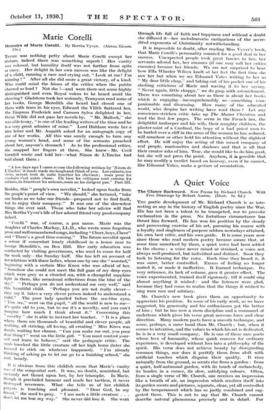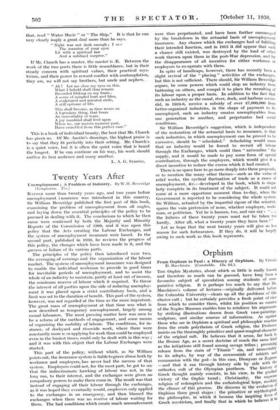A Quiet Voice
Tun poetic development of Mr. Richard Church is as inte- resting as any in the history of English poetry since the War. His has not been a talent to be trumpeted, nor to provoke exclamation in the press. No fortuitous circumstance has thrust him forward. Ile has won his position by the steady and persevering exercise of his art, pursuing his course with a loyalty and singleness of purpose seldom nowadays attained, his own best critic, and his own guide. It is some years now since those who read modern poetry became aware that, at some time unnoticed by them, a quiet voice had been added to the chorus : a voice never raised or strained, a voice not always well-produced, but individual and distinct. Soon they took to listening for the voice. Each time they heard it, it was surer, better controlled. Excess of feeling no longer muted it, or made it ineffective. It learned technique. Its very reticence, its lack of volume, gave it greater effect. The voice experimented, trained itself rigorously, till it could sing almost anything it wished : and the listeners were glad, because they had conic to realize that the things it wished to sing were rare and salutary.
Mr. Church's new book gives them an opportunity to appreciate his position. In some of his early work, as we have suggested, his generosity and his enthusiasms got the better of him ; but he has now a stern discipline and a command of undertone which gives his verse great nervous force and clear direction. Many modern poets have a smooth technique, and some, perhaps, a surer hand than Mr. Church ; but, when it comes to intention, and the values to which his art is dedicated, he is in a very small company. He is one of those rare poets whose love of humanity, whose quick concern for ordinary experience, is developed without loss into a philosophy of the spirit. His verse does not achieve beauty by disregarding common things, nor does it prettify them from aloft with artificial touches which disguise their quality. It rises naturally from the ground, as scents rise from a garden : from a quiet, half-autumnal garden, with its touch of melancholy, its bonfire in a corner, its slow, satisfying colours. Often, from a single verse of Mr. Church, one receives an impression like a breath of air, an impression which resolves itself into its garden scents and pictures, separate, clear, yet all controlled by the temperament which has so justly combined and sug- gested them. This is not to say that Mr. Church cannot describe noblest phenomena precisely and in detail. For
that, read "Water Music" or "The Ship." It is that he can very clearly imply a great deal more than he says.
"Night was not dark enough ; I saw The mansion of your eyes Lit with a spiritual law And a subdued surprise."
If Mr. Church has a master, the master is IE. Between the work of the two poets there is little resemblance, but in their steady concern with spiritual values, their practical mys- ticism, and their power to reward conflict with contemplation, they are, we will not say brothers, but uncle and nephew. , " Ah ! Let me close my eyes on this. What I beheld shall thus remain Recorded lifelong on my brain: A scene of mingled hurt and bliss, A sculptured and arrested strife, A still epitome of life.
This shall become, as time wears on A legendary thing, that bears An immortality of tears.
A joy mankind shall feed upon When we, our matrix-moment past, Have crumbled from this perfect cast."
This is a book of individual beauty, the best that Mr. Church has given us. Of Mr. Austin's drawings, the highest praise is to say that they fit perfectly into their, setting. Mr. Church's is a quiet voice, but it is often the quiet voice that is heard the longest. If he can continue on his way, his work should outlive its first audience and many another.
L. A. G. STRONG.









































 Previous page
Previous page